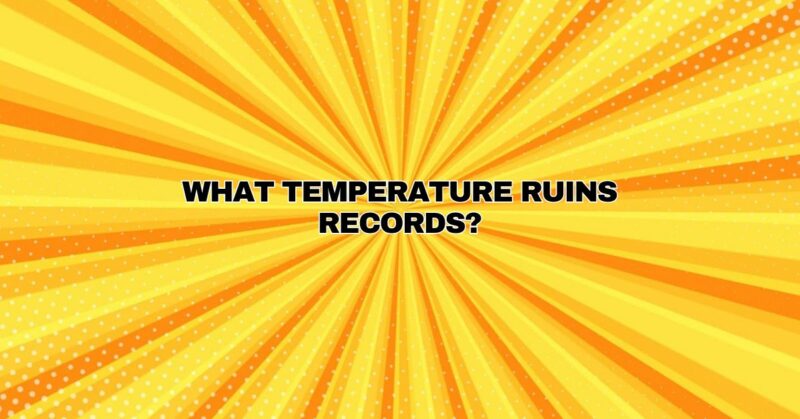Vinyl records, celebrated for their analog warmth and enduring appeal, have garnered a devoted following among audiophiles and collectors. However, vinyl records are not invulnerable to environmental factors, including temperature extremes. In this article, we will explore the temperature thresholds that can potentially ruin records and provide insights into how to protect your cherished vinyl collection from irreversible damage.
The Composition of Vinyl Records
Before delving into the temperature limits, it’s crucial to understand the materials used in vinyl records. Vinyl records are primarily constructed from polyvinyl chloride (PVC), a sturdy plastic known for its durability. While PVC is resilient, it is not immune to the effects of extreme temperatures.
High Temperatures: The Danger of Heat
High temperatures can have several adverse effects on vinyl records:
- Warping: Exposure to excessive heat can cause vinyl records to warp or curl. When PVC softens due to heat, records lose their flat shape and can no longer track properly on a turntable. Warped records result in audio distortion and playback problems.
- Groove Distortion: Prolonged exposure to high temperatures can lead to groove distortion, altering the shape and depth of the grooves on the record’s surface. This can result in tracking issues, including skips and jumps.
- Increased Vulnerability: Heat-damaged records are more susceptible to physical damage, such as cracks, fractures, and chipping. These forms of damage render records unplayable and can be irreversible.
- Label Deterioration: Labels affixed to vinyl records can suffer adhesive deterioration in high temperatures, leading to label peeling or detachment.
- Vinyl Softening: In extreme cases, heat can soften the vinyl material to the point where it becomes sticky and challenging to handle.
Low Temperatures: The Risk of Cold
Low temperatures can also pose risks to vinyl records:
- Brittleness: Vinyl records become more brittle when exposed to cold temperatures. This increased brittleness makes records prone to cracks and fractures, particularly when subjected to physical stress.
- Reduced Flexibility: Cold vinyl becomes less flexible, increasing the likelihood of damage during handling or playback. Records may shatter or break more easily when subjected to mechanical stress.
The Ideal Temperature for Vinyl Storage
To preserve the quality and lifespan of your vinyl records, it is essential to store them within an ideal temperature range:
- Temperature Range: Vinyl records are best stored in a cool, stable environment with temperatures ranging from 60°F to 70°F (15°C to 24°C).
Maintaining this consistent temperature range is crucial to ensuring the longevity and playback quality of your vinyl collection.
Protecting Vinyl Records from Extreme Temperatures
To protect your vinyl collection from the potential ruin caused by extreme temperatures, consider the following precautions:
- Controlled Storage: Store your vinyl records in a controlled environment with a stable temperature. Avoid locations prone to temperature fluctuations, such as attics, garages, or basements.
- Insulate Storage Shelves: Insulate the storage shelves where you keep your records to help maintain a stable temperature. Dedicated record storage furniture often provides insulation benefits.
- Gradual Warming: If your vinyl records have been exposed to extreme cold, allow them to gradually warm up to room temperature before playing them. This minimizes the risk of stylus or groove damage.
- Handle with Care: Exercise caution when handling vinyl records in extreme temperatures. Avoid sudden temperature changes and gently handle records to prevent accidental stress or impact.
- Protect Packaging: Inspect and protect the cardboard sleeves and jackets of your vinyl records, as both extreme heat and cold can make them more brittle. Consider using polyethylene or polypropylene outer sleeves for added protection.
Conclusion
Extreme temperatures can indeed ruin vinyl records, causing warping, groove distortion, brittleness, and other forms of damage. By maintaining a controlled storage environment, handling records with care, and taking precautions to protect packaging materials, you can ensure that your cherished vinyl collection remains in excellent condition, ready to deliver its analog warmth and timeless music for years to come

